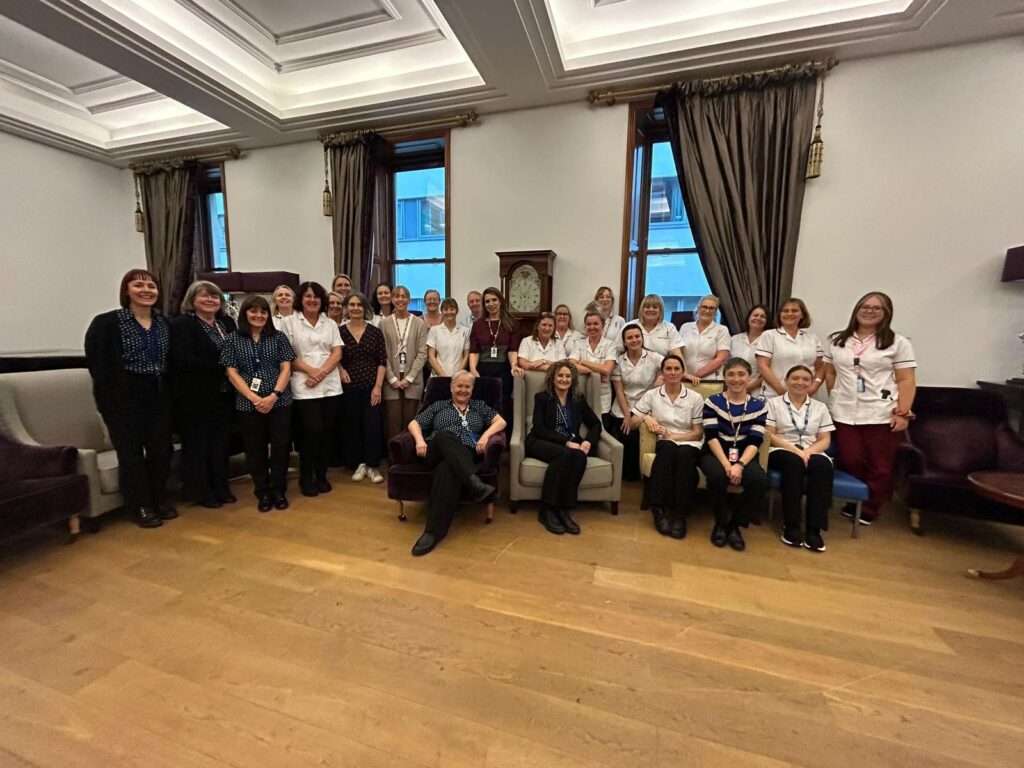This month (May) marks the 35th anniversary of breast screening in Newcastle.
The service, based at the Royal Victoria Infirmary, provides screening for people in Newcastle, North Tyneside, Northumberland and Derwentside.
With a static site at CAV and three mobile trailers, our team carries out around 40,000 screening mammograms every year, with screening alone diagnosing around 360 new cancers.
Originally based at Newcastle General Hospital, our first patients were screened in May 1989 using analogue mammography equipment and processors with chemicals.
The service quickly grew and by July, the region’s first mobile screening service was launched by Diana Moran – the Green Goddess – who later returned to open the extension to the breast screening and assessment centre.

Further developments continued throughout the 90s including the establishment of the first Macmillan nursing post solely for women with breast cancer and the launch of a pilot project to offer mammograms to women in their forties believed to be at high risk of developing breast cancer.
In its’ first three years alone, almost 130,000 women in the north east had received screening appointments.
By 1998 the service was on the move to its new home at the RVI’s Leazes Wing where is remained until 2009 before moving to its current home in the New Victoria Wing.
Admin team leader Philippa Pattison, who has been part of the screening service team since it was established in 1989, has seen first-hand the way the service has changed over the last 35 years.
“In terms of my role the biggest development has been the move away from paper notes and going paper light. Everything is done electronically now so we can send notes to the mobile trailers and have a text reminder service for appointments,” she said.
But for Philippa the best part of her role is the team she works with and knowing they are providing a lifesaving service – especially to those women who may not have had any symptoms.
In its 35-year history, the service has also been at the forefront of research and technological developments including:
- In 2014, Newcastle Hospitals became the UK’s first trust to offer a procedure known as radioactive seed localisation. The procedure uses a very low dose radioactive seed – about the size of a grain of rice – as a beacon to guide surgeons to the exact location of the tumour that is being removed. This year the team began the move away from using iodine seeds and now use pintuition magnetic markers to accurately mark the tumour.
- Last year – along with Newcastle University – the service was awarded funding to examine the development of low-dose molecular breast imagine technology aimed at detecting abnormal changes in women with dense breast tissue.
Erika Ridley – Health promotion officer in breast health education – shares her experiences on this anniversary year.
Over the past 35 years, as the service has grown, there have been many developments, including the introduction of new workforce roles. Erika Ridley has worked with the Newcastle breast screening service for 22 years.
Passionate about breast screening, Erika moved into her current health promotion officer role, in which she works hard to raise the profile of the screening service within hard-to-reach communities. “Early detection is key, that is why it is so important that everyone eligible takes up their offer of a screening appointment.”
Erika explains: “A big part of my role is to work within harder to reach communities. I take information out into the community and into settings where people feel comfortable. Providing the most up to date information supports people to make informed decisions about their screening appointments.”
By going out into community settings Erika is able to work with people and help them overcome any fears or concerns they might have about coming to their screening appointments.
“This is one of the best parts of my job – one of the biggest myths around breast screening is pain. The procedure can be uncomfortable but it shouldn’t be excruciating, the most common thing people say as they leave is ‘it was nowhere near as uncomfortable as what I thought, it was actually ok.’ It’s really important that we’re able to support anyone who is worried about coming for their appointment.”
Breast screening in Newcastle has changed dramatically since is launch 35 years ago and for Erika the biggest change has been the introduction of digital mammography.
Reflecting on the part of her job that makes her proud Erika said: “Knowing I make a difference. People have attended my talks and through the talk have attended their breast screening appointment and had an early-stage cancer diagnosis. I’m also really proud to working with people with a learning disability – helping them to achieve their examination feeling comfortable and secure.”
Regular breast screening is one of the best ways to spot a cancer that is too small to feel or see and in Newcastle around 360 cancers are diagnosed each year through screening alone. Annually, around 52,000 people are invited for breast screening and approximately 75% take up this invitation meaning there is still work to be done around raising awareness of the importance of screening.
More information about breast screening in Newcastle is available here.
